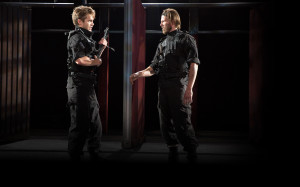THE HANGOVER REPORT – Shakespeare in the Park turns in a sensational (and coherent) TROILUS AND CRESSIDA
- By drediman
- August 18, 2016
- No Comments

A scene from Shakespeare in the Park’s revival of “Troilus and Cressida”
For its second Shakespeare in the Park offering this summer, the Public turned in one of its most successful offerings in recent years in the unlikely form of a sensational Troilus and Cressida at the Delacorte. Considered one of Shakespeare’s “problem plays” and certainly one of the Bard’s least-performed works, Troilus and Cressida is Shakespeare’s pseudo-comic take on the Trojan War. In many ways, in Troilus and Cressida, Shakespeare may have written – intentionally or not – one of the first anti-war plays in the Western theatrical canon. Set on both sides of the Trojan War, the play highlights the senselessness of the whole endeavor. Almost as if to suggest the absurdity of war, Shakespeare has his romantically-involved title characters almost lost in the cogs of the war machine. Although there are tragic elements in the play, the work is less of a tragedy per se as it is a seemingly random confluence of characters and situations.
Director Daniel Sullivan has done a smashing job of making dramatic sense of Shakespeare’s jumble of a play. In an inspired if unorthodox move, Mr. Sullivan has updated his Troilus and Cressida to take place in a contemporary battle zone (the Middle East, perhaps?). Heroic swords are replaced by semi-automatic firearms, and the Greek chorus is replaced by the hovering media (no, there is no chorus in Shakespeare’s play, but surely he must have been aware of this device in Ancient Greek drama). As a result, the climactic battle scenes felt jilted and haphazard – almost surreal – as befits the play. The excellent technical elements gave the production a spare, muscular sensibility, thanks to David Zinn on sets and costumes, Robert Wierzel on lighting, and Mark Menard on sound.
The acting in this testosterone-driven Shakespeare in the Park presentation was superb all-around. Some notable contributions came from Bill Heck’s authoritative Hector, John Glover’s scheming Pandarus, Andrew Burnap’s earnest Troilus, Ismenia Mendes’s refreshingly matter-of-fact Cressida, and Louis Cancelmi’s (replacing an injured David Harbour) volatile Achilles. Luckily, these superlative and distinctive characterizations drew one’s attention away from Shakespeare’s admittedly awkward plotting and strained storytelling.
HIGHLY RECOMMENDED
TROILUS AND CRESSIDA
Off-Broadway, Play
Shakespeare in the Park (The Public Theater)
3 hours (with one intermission)
Closed

 Copyright © 2024
Copyright © 2024
Leave a Reply